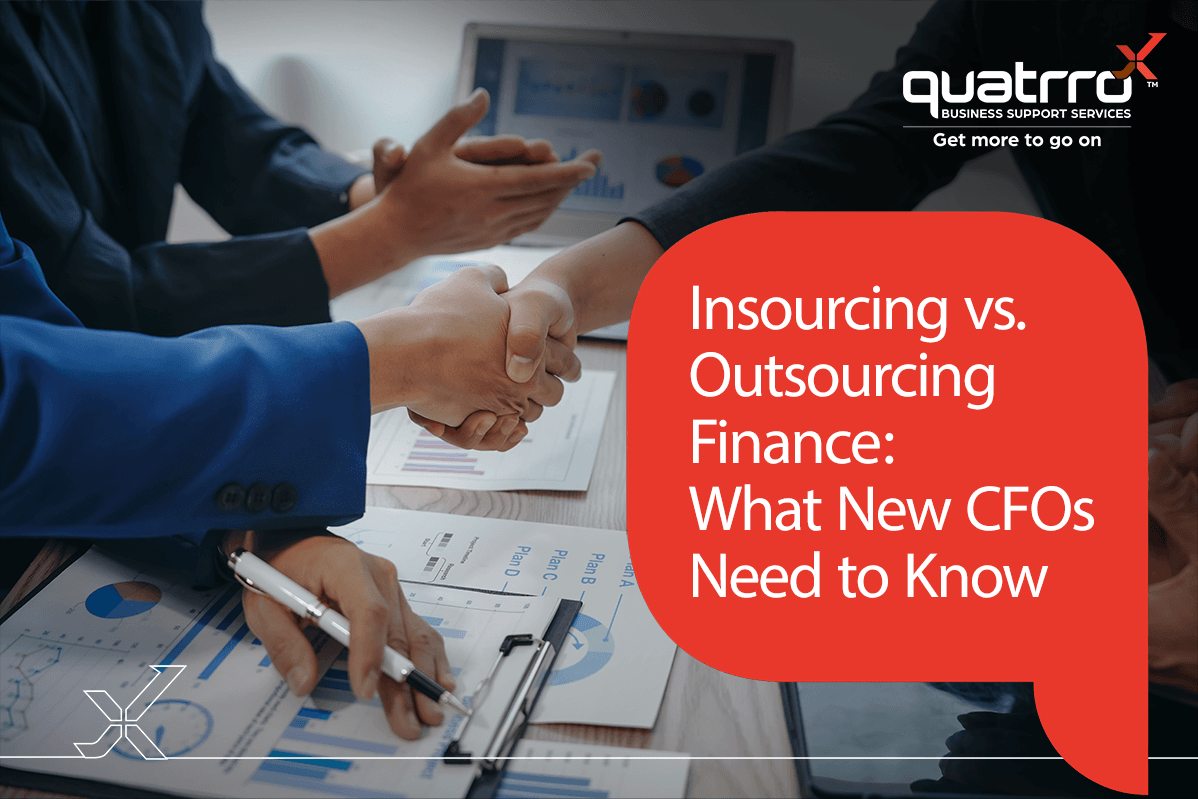Blog Details
Insourcing vs. Outsourcing Finance: What New CFOs Need to Know
September 4, 2024

Understanding the difference between insourcing and outsourcing finance is crucial for new CFOs in navigating today’s dynamic business landscape and finding a way to make their mark and add value to their organization. When it comes to outsourcing finance and accounting, the strategic decision-making process can significantly impact the organization’s financial health and back office operational efficiency, so must be done with great thought and vision.
In this comprehensive guide tailored for new CFOs, we will delve into the nuances of insourcing versus outsourcing, providing valuable insights and actionable advice to help you make informed decisions that drive success for yourself and your organization.
Insourcing the finance and accounting function involves keeping financial tasks within the company. This means that CFOs manage their financial operations with an in-house team of employees. There are several reasons why a company might choose to insource these activities. It can allow for greater control over financial processes, which can be helpful for companies with complex transactions and revenue models
While insourcing can align financial strategy more closely with core business objectives due to the financial team’s enhanced understanding of the company’s technology and services, it also carries several downsides.
Insourcing may lead to increased costs associated with salaries, benefits, and necessary training for the finance team to stay abreast of compliance and industry changes. It can also pose a challenge in terms of scalability, as the needs of the company grow, requiring the in-house finance team to expand simultaneously—a process that can be resource-intensive.
Furthermore, the responsibility of staying on top of the latest financial regulations and industry trends rests solely on the shoulders of the internal team, potentially stretching resources thin. For CFOs, these factors must be carefully weighed to ascertain if insourcing is congruent with the company’s resource capabilities and long-term financial sustainability.
Another advantage is the potential for cost savings. Outsourced finance and accounting services areoften more cost-effective than maintaining an in-house team, particularly for startups and small or growing companies with limited resources.
Lastly, outsourcing can free up internal resources, allowing the company to focus more on core business areas, like product development and market expansion – which could be key during times of growth. It also offers the benefit of an external perspective, which can provide industry best practices and valuable insights for financial decision-making.
Start-ups and Outsourced Accountings
Having worked with many start-ups, we know things can initially begin as a very bootstrap operation. Most small teams are required to work to tackle everything, from coding to customer support, with the founder possibly even handling the books. However, as they secure funding and scale their operations, their internal accounting can quickly become a bottleneck when it takes a back seat to other, more pressing, tasks that need to be completed.
The founders, passionate about product development, often struggle to keep up with the complexities of managing payroll, accounts payable and receivable, and financial reporting. This takes away valuable time from their core mission.
The role of the CFO is pivotal when it comes to deciding whether to insource finance and accounting functions. CFOs must assess the current and future needs of the company, taking into account the complexity of the industry and their market, and the specific financial challenges both present. In choosing to insource, CFOs are committing to build and maintain a team that is deeply integrated with the company’s various teams and business objectives.
A newCFO must consider the talent and resources required to manage the company’s finances effectively in-house. This involves not just hiring qualified personnel but also ensuring ongoing training and development to keep up with the fast-paced changes in the industry, and finance itself. Additionally, the CFO has to ensure that the in-house team is equipped with the right tools and technology to manage financial operations efficiently.
Ultimately, the decision to insource should align with the company’s long-term strategy and its capacity to support a robust financial infrastructure internally
Influencing outsourcing decisions also involves ensuring data security and compliance, which are critical in today’s companies. The CFO must assess the risks associated with sharing sensitive financial information and ensure that the outsourced partner has strong security protocols in place.
Another key factor is the integration of financial systems and processes between the company and the external firm to ensure seamless financial operations.
According to 2024’s Gartner Report for CFO’s, the majority of CFOs interviewed indicated they expected to be focused on leading digital transformation efforts in the finance function in 2024. In fact, over 70% of these CFO’s considered improving finance metrics, insights and storytelling, leading change management efforts, and optimizing costs to be critical to their success this year. All of these are areas that should be evaluated by the CFO when choosing an outsourced service provider.
Insourcing finance and accounting work comes with certain advantages. It fosters a dedicated team that is fully immersed in the company’s culture and goals, leading to an aligned financial strategy
On the flip side, insourcing can present challenges, particularly in terms of costs. Salaries, benefits, and ongoing training for a finance team can be significant, not to mention the cost of technology platforms, maintenance and support to leverage for producing the financial reporting and insights needed by the organization. There’s also the issue of scalability; as the company grows, the in-house team and technology must scale accordingly, which can be resource-intensive and potentially even cost-prohibitive. In addition, the responsibility of staying up-to-date with the latest financial regulations and industry trends rests solely on the CFO and their team, which can be a considerable undertaking.
Balancing these factors is crucial for CFOs, especially new ones, when considering insourcing as a viable financial management strategy.
The Pros and Cons of Outsourcing Finance and Accounting Functions
Outsourcing finance and accounting work offers the advantage of accessing specialized expertise without the commitment of full-time hires. This can lead to significant, immediate cost savings, especially in terms of salaries, benefits, training, and other overhead.
An outsourced model is also scalable; as the business grows or faces downturns, the level of service can be adjusted accordingly. Additionally, outsourced finance and accounting services can provide insights and best practices from a breadth of industry experts.
However, outsourcing also has its disadvantages. There may be less control over how financial tasks are prioritized and executed if your service partner does not communicate expected timelines appropriately. Communication challenges can arise, potentially leading to misunderstandings or delays.
Security risks must be considered, as confidential financial information is handled by an external party. Furthermore, if the outsourced service provider is not well-versed in the specific needs of your industry, their advice may not align with the company’s strategic direction.
NewCFOs must especially weigh these pros and cons carefully to ensure that the decision to outsource aligns with the company’s operational and financial goals.
Insourcing typically requires upfront investment in recruiting, hiring, training, technology, and other initial overhead. These costs are predictable and can be budgeted for, but they represent a fixed cost that the company must bear regardless of revenue fluctuations.
Outsourcing, alternatively, can be more variable and flexible, with costs often tied to the level and scope of services needed. This can help companies manage cash flow more effectively, especially during growth stages or periods of uncertainty.
When evaluating the financial implications, consider the long-term value each approach may bring to the company and how it aligns with the organization’s financial goals.
Assessing Organizational Capacity and Needs
Assessing the capacity and needs of the organization, today and into the future, is essential when determining whether to insource or outsource finance functions. CFOs need to consider the size of the company, the complexity of the financial operations, and the existing internal resources. For smaller companies or startups, the depth of financial activities may not justify a full in-house team, making outsourcing a more logical choice.
Conversely, larger organizations with complex financial transactions across different markets may require the control and immediate availability of an in-house team. This need for direct oversight and integration with the broader business strategy often makes insourcing the preferred option.
In addition to capacity, it’s important to evaluate the company’s growth trajectory. If rapid scaling is anticipated, the flexibility of outsourcing may be beneficial in the short term, with a shift towards insourcing as the company stabilizes and matures if it makes sense to do so.
Ultimately, the decision whether to insource or outsource your finance and accounting functions must be made based on what is best for the organization and their objectives, but should always be based on an objective view of all the pieces of data gathered throughout the evaluation process. While it can feel especially daunting for a new CFO to be faced with making this decision, outlining a process for completing your evaluation, taking the time needed to complete the process in full, and then discussing your pro/con list with other members of your leadership team will surely lead you to the right decision. Still not sure, here’s a list of 10 Signs That It’s Time to Outsource Your Accounting.
In this comprehensive guide tailored for new CFOs, we will delve into the nuances of insourcing versus outsourcing, providing valuable insights and actionable advice to help you make informed decisions that drive success for yourself and your organization.
Understanding Insourcing and Outsourcing in Finance and Accounting
The Concept of Insourcing Finance and AccountingInsourcing the finance and accounting function involves keeping financial tasks within the company. This means that CFOs manage their financial operations with an in-house team of employees. There are several reasons why a company might choose to insource these activities. It can allow for greater control over financial processes, which can be helpful for companies with complex transactions and revenue models
While insourcing can align financial strategy more closely with core business objectives due to the financial team’s enhanced understanding of the company’s technology and services, it also carries several downsides.
Insourcing may lead to increased costs associated with salaries, benefits, and necessary training for the finance team to stay abreast of compliance and industry changes. It can also pose a challenge in terms of scalability, as the needs of the company grow, requiring the in-house finance team to expand simultaneously—a process that can be resource-intensive.
Furthermore, the responsibility of staying on top of the latest financial regulations and industry trends rests solely on the shoulders of the internal team, potentially stretching resources thin. For CFOs, these factors must be carefully weighed to ascertain if insourcing is congruent with the company’s resource capabilities and long-term financial sustainability.
Outsourcing Finance and Accounting Work: A Different Approach
Outsourcing finance and accounting work involves hiring an external firm or professionals to handle financial tasks. This can range from day-to-day accounting to high-level financial strategy and analysis. The primary benefit of outsourcing is access to specialized expertise without the overhead costs of full-time employees. CFOs may find this approach allows for a scalable solution to financial management that easily adjusts as the company grows.Another advantage is the potential for cost savings. Outsourced finance and accounting services areoften more cost-effective than maintaining an in-house team, particularly for startups and small or growing companies with limited resources.
Lastly, outsourcing can free up internal resources, allowing the company to focus more on core business areas, like product development and market expansion – which could be key during times of growth. It also offers the benefit of an external perspective, which can provide industry best practices and valuable insights for financial decision-making.
Start-ups and Outsourced Accountings
Having worked with many start-ups, we know things can initially begin as a very bootstrap operation. Most small teams are required to work to tackle everything, from coding to customer support, with the founder possibly even handling the books. However, as they secure funding and scale their operations, their internal accounting can quickly become a bottleneck when it takes a back seat to other, more pressing, tasks that need to be completed.
The founders, passionate about product development, often struggle to keep up with the complexities of managing payroll, accounts payable and receivable, and financial reporting. This takes away valuable time from their core mission.
The Role of CFOs in Insourcing vs. Outsourcing Decisions
Evaluating the CFO’s Role in InsourcingThe role of the CFO is pivotal when it comes to deciding whether to insource finance and accounting functions. CFOs must assess the current and future needs of the company, taking into account the complexity of the industry and their market, and the specific financial challenges both present. In choosing to insource, CFOs are committing to build and maintain a team that is deeply integrated with the company’s various teams and business objectives.
A newCFO must consider the talent and resources required to manage the company’s finances effectively in-house. This involves not just hiring qualified personnel but also ensuring ongoing training and development to keep up with the fast-paced changes in the industry, and finance itself. Additionally, the CFO has to ensure that the in-house team is equipped with the right tools and technology to manage financial operations efficiently.
Ultimately, the decision to insource should align with the company’s long-term strategy and its capacity to support a robust financial infrastructure internally
A CFO’s Influence in Outsourcing Decisions
When a CFO considers outsourcing, they leverage their position to determine how external financial expertise can complement the company’s strategic goals. The savvy CFO must evaluate all potential partners’ ability to understand and contribute to the financial landscape specific to their industry. This means looking beyond cost savings to consider the quality of services, efficiency, and how well the outsourced firm can adapt to the company’s changing needs.Influencing outsourcing decisions also involves ensuring data security and compliance, which are critical in today’s companies. The CFO must assess the risks associated with sharing sensitive financial information and ensure that the outsourced partner has strong security protocols in place.
Another key factor is the integration of financial systems and processes between the company and the external firm to ensure seamless financial operations.
According to 2024’s Gartner Report for CFO’s, the majority of CFOs interviewed indicated they expected to be focused on leading digital transformation efforts in the finance function in 2024. In fact, over 70% of these CFO’s considered improving finance metrics, insights and storytelling, leading change management efforts, and optimizing costs to be critical to their success this year. All of these are areas that should be evaluated by the CFO when choosing an outsourced service provider.
Pros and Cons of Insourcing and Outsourcing
Advantages and Disadvantages of Insourcing Finance and Accounting FunctionsInsourcing finance and accounting work comes with certain advantages. It fosters a dedicated team that is fully immersed in the company’s culture and goals, leading to an aligned financial strategy
On the flip side, insourcing can present challenges, particularly in terms of costs. Salaries, benefits, and ongoing training for a finance team can be significant, not to mention the cost of technology platforms, maintenance and support to leverage for producing the financial reporting and insights needed by the organization. There’s also the issue of scalability; as the company grows, the in-house team and technology must scale accordingly, which can be resource-intensive and potentially even cost-prohibitive. In addition, the responsibility of staying up-to-date with the latest financial regulations and industry trends rests solely on the CFO and their team, which can be a considerable undertaking.
Balancing these factors is crucial for CFOs, especially new ones, when considering insourcing as a viable financial management strategy.
The Pros and Cons of Outsourcing Finance and Accounting Functions
Outsourcing finance and accounting work offers the advantage of accessing specialized expertise without the commitment of full-time hires. This can lead to significant, immediate cost savings, especially in terms of salaries, benefits, training, and other overhead.
An outsourced model is also scalable; as the business grows or faces downturns, the level of service can be adjusted accordingly. Additionally, outsourced finance and accounting services can provide insights and best practices from a breadth of industry experts.
However, outsourcing also has its disadvantages. There may be less control over how financial tasks are prioritized and executed if your service partner does not communicate expected timelines appropriately. Communication challenges can arise, potentially leading to misunderstandings or delays.
Security risks must be considered, as confidential financial information is handled by an external party. Furthermore, if the outsourced service provider is not well-versed in the specific needs of your industry, their advice may not align with the company’s strategic direction.
NewCFOs must especially weigh these pros and cons carefully to ensure that the decision to outsource aligns with the company’s operational and financial goals.
Factors to Consider When Choosing Between Insourcing and Outsourcing
Financial Implications: Insourcing vs. OutsourcingInsourcing typically requires upfront investment in recruiting, hiring, training, technology, and other initial overhead. These costs are predictable and can be budgeted for, but they represent a fixed cost that the company must bear regardless of revenue fluctuations.
Outsourcing, alternatively, can be more variable and flexible, with costs often tied to the level and scope of services needed. This can help companies manage cash flow more effectively, especially during growth stages or periods of uncertainty.
When evaluating the financial implications, consider the long-term value each approach may bring to the company and how it aligns with the organization’s financial goals.
Assessing Organizational Capacity and Needs
Assessing the capacity and needs of the organization, today and into the future, is essential when determining whether to insource or outsource finance functions. CFOs need to consider the size of the company, the complexity of the financial operations, and the existing internal resources. For smaller companies or startups, the depth of financial activities may not justify a full in-house team, making outsourcing a more logical choice.
Conversely, larger organizations with complex financial transactions across different markets may require the control and immediate availability of an in-house team. This need for direct oversight and integration with the broader business strategy often makes insourcing the preferred option.
In addition to capacity, it’s important to evaluate the company’s growth trajectory. If rapid scaling is anticipated, the flexibility of outsourcing may be beneficial in the short term, with a shift towards insourcing as the company stabilizes and matures if it makes sense to do so.
Ultimately, the decision whether to insource or outsource your finance and accounting functions must be made based on what is best for the organization and their objectives, but should always be based on an objective view of all the pieces of data gathered throughout the evaluation process. While it can feel especially daunting for a new CFO to be faced with making this decision, outlining a process for completing your evaluation, taking the time needed to complete the process in full, and then discussing your pro/con list with other members of your leadership team will surely lead you to the right decision. Still not sure, here’s a list of 10 Signs That It’s Time to Outsource Your Accounting.
The Right Partner For You
By partnering with a trusted outsourcing firm like Quatrro Business Support Services, you gain access to expertise, technology, and insights that can transform your approach to financial management. Partner with us to get more more to go on and refocus your energy on what truly matters—growing your business. Contact us today to explore how we can streamline your financial operations and secure your path to success.Latest Insights
Related Blogs
Contact Us







